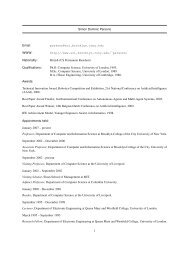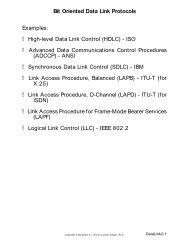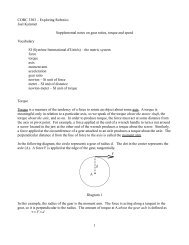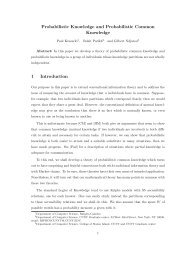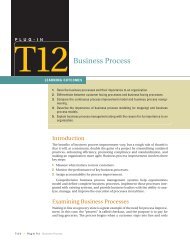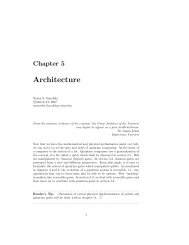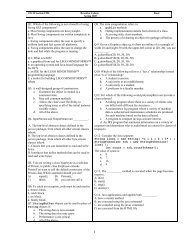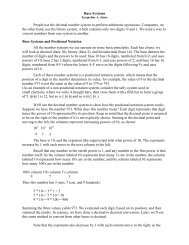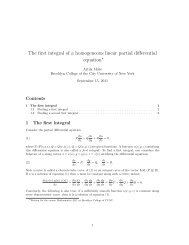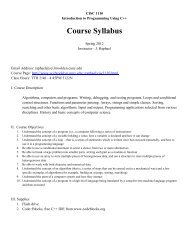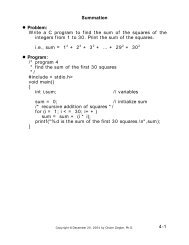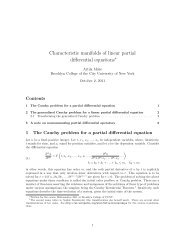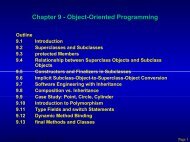*302 Greig and Others v Insole and Others 1977 G. No. 22461977 J ...
*302 Greig and Others v Insole and Others 1977 G. No. 22461977 J ...
*302 Greig and Others v Insole and Others 1977 G. No. 22461977 J ...
Create successful ePaper yourself
Turn your PDF publications into a flip-book with our unique Google optimized e-Paper software.
[1978] 1 W.L.R. 302 Page 14<br />
[1978] 1 W.L.R. 302 [1978] 3 All E.R. 449 (1978) 122 S.J. 162 [1978] 1 W.L.R. 302 [1978] 3 All E.R. 449 (1978)<br />
122 S.J. 162<br />
(Cite as: [1978] 1 W.L.R. 302)<br />
moter. His Lordship continued:]<br />
In these circumstances, so far as it is relevant,<br />
I do not accept the force of any criticism on<br />
moral grounds that may have been levelled against<br />
players such as Mr. Snow <strong>and</strong> Mr. Procter for entering<br />
into contracts with World Series Cricket. I do<br />
not see that it was reasonable for the defendants,<br />
who had placed themselves under no kind of commitment<br />
to the plaintiff players for the future, to expect<br />
these players to *316 subject<br />
themselves to a self-imposed embargo against playing<br />
for any private promoter during the winter<br />
months, merely because such promoter might be organising<br />
matches which would in certain circumstances<br />
compete with official Test Matches. If<br />
cricketing authorities employ a player to go on a<br />
tour or indeed perhaps even if they employ him to<br />
play in one or more Test Matches at home, it may<br />
be open to them, as a matter of fair negotiation, to<br />
dem<strong>and</strong> from him, as a price for the privileges<br />
which he himself will derive from participating in<br />
the match, a limited covenant precluding him from<br />
playing for competitors. If such covenant represents<br />
no more than is reasonably required for the authorities'<br />
protection, in terms of duration place <strong>and</strong> otherwise<br />
<strong>and</strong> is reasonable in the interests of the public,<br />
it may perhaps be enforceable according to its<br />
terms. I do not, however, think that such authorities<br />
can regard a player as being in breach of a moral<br />
commitment to them merely because he has failed<br />
to treat himself as being under a covenant not to<br />
play for a competitor, which they have not chosen<br />
to exact from him. A professional cricketer needs to<br />
make his living as much as any other professional<br />
man. I think it is straining the concept of loyalty too<br />
far for authorities such as the defendants to expect<br />
him to enter into a self-denying ordinance not to<br />
play cricket for a private promoter during the<br />
winter months, merely because the matches promoted<br />
could detract from the future profits made by<br />
the authorities, who are not themselves willing or in<br />
a position to offer him employment over the winter<br />
or to guarantee him employment for the future. It<br />
follows from this that I can likewise see no sufficient<br />
grounds why the players concerned, with the<br />
possible exception of Mr. <strong>Greig</strong>, can justifiably be<br />
criticised on moral grounds for having entered into<br />
contracts with World Series Cricket in conditions of<br />
secrecy. The subsequent actions of the defendants<br />
have made it abundantly clear that, had they been<br />
informed in advance of the World Series project,<br />
they would have done their utmost to prevent it<br />
from taking root <strong>and</strong> thus to prevent the players involved<br />
from enjoying the advantages offered to<br />
them by World Series Cricket.<br />
For all these reasons, to anticipate a little, I reject<br />
any suggestions that the retrospective imposition of<br />
the bans in question on those players who had<br />
already contracted with World Series Cricket, can<br />
be justified on the grounds that it constituted a<br />
well-merited punishment. The penal aspect of the<br />
bans featured prominently, though not exclusively,<br />
in the evidence of a number of the defendants' witnesses,<br />
such as Mr. Steele <strong>and</strong> Mr. Hadlee. If the<br />
bans are to be justified at all, they must in my judgment<br />
be justified on grounds other than this. I<br />
should emphasise, however, that their possible merits<br />
as punishment were not in any way relied on in<br />
argument by the defendants' counsel, who relied on<br />
quite different grounds to justify them. What has<br />
been said in the present context therefore does not<br />
come near to disposing of any part of the case. [His<br />
Lordship then dealt with the evidence regarding<br />
conditions of work of cricketers in Australia, India,<br />
New Zeal<strong>and</strong>, West Indies <strong>and</strong> Pakistan.]<br />
VI Mr. Kerry Packer, the Australian Cricket Board<br />
<strong>and</strong> Australian television<br />
Against this background, I must now embark<br />
on a more detailed history of the facts of this case,<br />
which must begin in Australia with Mr. Kerry<br />
Packer. Mr. Packer is an Australian national, who<br />
has been engaged all his adult life in business activities<br />
of one kind or another. These activities include<br />
television <strong>and</strong> publishing. He has a particular<br />
*317 association with a company<br />
known as Television Corporation Ltd., which forms<br />
part of a large group of companies in which he is a<br />
© 2011 Thomson Reuters.



